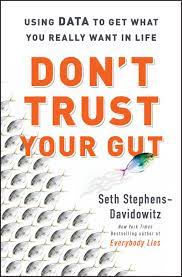[ad_1]
 Really don’t Trust Your Gut: Making use of Details to Get What You Genuinely Want in Lifestyle by Seth Stephens-Davidowitz.
Really don’t Trust Your Gut: Making use of Details to Get What You Genuinely Want in Lifestyle by Seth Stephens-Davidowitz.
Printed in Could 2022
Don’t Trust Your Intestine is Seth Stephens-Davidowitz’s follow-up to his excellent 2017 guide, All people Lies.
Wherever Every person Lies was an exploration of Google queries as a significant facts exploration instrument, Don’t Rely on Your Intestine is about leveraging large details for own expansion.
Stephens-Davidowitz, a educated economist and previous Google data scientist, seeks to persuade readers that knowledge (in particular huge information) are better guides to clever actions than intuition or conventional wisdom.
Examples from Never Trust Your Intestine of what every person believes but everyone is erroneous about range from entrepreneurship to relationships.
The mythology of the young (usually higher education dropout) start-up founder persists. When we feel of tech businesses that created it significant, our minds are inclined to settle on Mark Zuckerberg, Invoice Gates or Michael Dell. Nonetheless, the knowledge on successful business people contradict the archetype of the youthful, socially uncomfortable (usually white male) founder.
In accordance to investigation based on massive knowledge described in Don’t Have confidence in Your Intestine, the most effective business people are expert pros in their 40s, 50s or even more mature. The persons who commence and operate corporations that make cash are demographically varied and have worked for a long time (usually decades) in the industry in which their business is located.
On the marriage facet, Really do not Belief Your Gut describes a selection of scientific tests demonstrating how terribly we comprehend how partners fulfill or what retains them collectively. Examining the knowledge from relationship applications, Stephens-Davidowitz shares that getting judged good-on the lookout is fantastic for receiving a lot of dates but suboptimal for forming extensive-long lasting interactions.
As an ever-larger proportion (perhaps the the greater part) of new associations start off on courting applications and web-sites, the info from these platforms provide fantastic alternatives for study. Some benefits explained in Don’t Belief Your Intestine on dating include things like:
- A: If you want quite a few dates, your courting profile should really emphasize extremes in behaviors, appears to be or predilections. What you want is a few people to genuinely want to day you, alternatively than a lot of men and women being lukewarm on an ordinary set of attributes.
- B: It is a fantasy that conventionally less desirable persons (whatever that implies) simply cannot get dates with conventionally appealing individuals (what ever that usually means). In accordance to the data, the critical is to message as quite a few folks as doable. Relationship success, as in other endeavors in daily life, is mostly about maximizing options.
Never Rely on Your Intestine is full of knowledge-driven tales created to support self-advancement. What is the greater ed connection? (And you know, I usually have to come across just one.)
In looking through Never Trust Your Intestine, I kept contemplating about how the purpose of creating data-pushed choices in how we run our schools and universities always appears to be to be “just all around the corner.”
For decades, we have identified the existential necessity of acquiring details guideline the style and design and functions of our establishments. This target is not controversial. Several in increased ed would argue towards the desirability of employing details for institutional conclusion making.
And yet …
One of the difficulties to information-driven selection making that Never Rely on Your Gut illuminates is transferring from the individual to the group. It is much easier to foundation our unique selections on info than to leverage facts to make organizational alternatives.
Never Trust Your Gut is a enjoyment browse, but we need a e book that integrates a major data point of view with the literature on how organizations (and universities) adjust.
Most likely if ample of us in the higher ed globe read and talked about Really do not Trust Your Intestine, we may explore substitute paths to the facts-driven college.
What are you looking at?
[ad_2]
Source backlink


More Stories
Rethinking Traditional Methods in Education Systems
The Importance of Emotional Learning in Education
The Role of AI in Revolutionizing Education